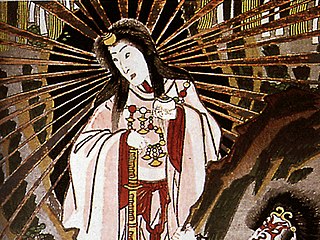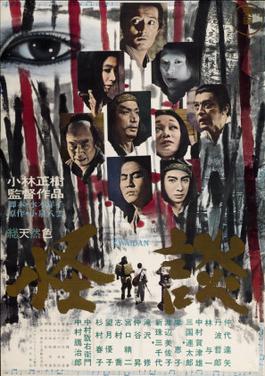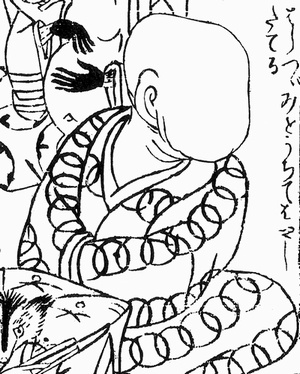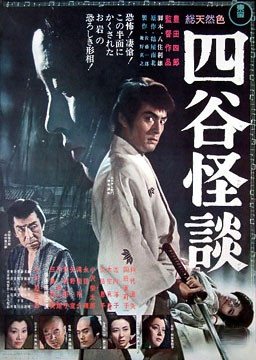
Hideo Nakata is a Japanese filmmaker.

Takashi Shimizu is a Japanese filmmaker. He is best known for being the creator of the Ju-On franchise, and directing four of its films, internationally, in both Japan and the U.S. According to film scholar Wheeler Winston Dixon, Shimizu is "one of a new breed of Japanese horror directors" who prefers to "suggest menace and violence rather than directly depict it."

Yūrei are figures in Japanese folklore analogous to the Western concept of ghosts. The name consists of two kanji, 幽 (yū), meaning "faint" or "dim" and 霊 (rei), meaning "soul" or "spirit". Alternative names include Bōrei (亡霊), meaning ruined or departed spirit, Shiryō (死霊), meaning dead spirit, or the more encompassing Yōkai (妖怪) or Obake (お化け). Like their Chinese, Korean, and Western counterparts, they are thought to be spirits barred from a peaceful afterlife.

A ghost story is any piece of fiction, or drama, that includes a ghost, or simply takes as a premise the possibility of ghosts or characters' belief in them. The "ghost" may appear of its own accord or be summoned by magic. Linked to the ghost is the idea of a "haunting", where a supernatural entity is tied to a place, object or person. Ghost stories are commonly examples of ghostlore.

Kwaidan is a 1964 Japanese anthology horror film directed by Masaki Kobayashi. It is based on stories from Lafcadio Hearn's collections of Japanese folk tales, mainly Kwaidan: Stories and Studies of Strange Things (1904), for which it is named. The film consists of four separate and unrelated stories. Kwaidan is an archaic transliteration of the term kaidan, meaning "ghost story". Receiving critical acclaim, the film won the Special Jury Prize at the 1965 Cannes Film Festival, and received an Academy Award nomination for Best Foreign Language Film.

Japanese horror is horror fiction derived from popular culture in Japan, generally noted for its unique thematic and conventional treatment of the horror genre differing from the traditional Western representation of horror. Japanese horror tends to focus on psychological horror, tension building (suspense), and supernatural horror, particularly involving ghosts (yūrei) and poltergeists. Other Japanese horror fiction contains themes of folk religion such as possession, exorcism, shamanism, precognition, and yōkai. Media in which the genre of Japanese horror fiction can be found include artwork, theater, literature, film, anime and video games.

The noppera-bō (のっぺらぼう), or faceless ghost, is a Japanese yōkai that looks like a human but has no face. They are sometimes mistakenly referred to as a mujina, an old Japanese word for a badger or raccoon dog. Although the mujina can assume the form of the other, noppera-bō are usually disguised as humans. Such creatures were thought to sometimes transform themselves into noppera-bō in order to frighten humans. Lafcadio Hearn used the animals' name as the title of his story about faceless monsters, probably resulting in the misused terminology.
Gakkō no Kaidan may refer to:

Kwaidan: Stories and Studies of Strange Things, often shortened to Kwaidan, is a 1904 book by Lafcadio Hearn that features several Japanese ghost stories and a brief non-fiction study on insects. It was later used as the basis for a 1964 film, Kwaidan, by Masaki Kobayashi.
Kaidan is a Japanese word consisting of two kanji: 怪 (kai) meaning "strange, mysterious, rare, or bewitching apparition" and 談 (dan) meaning "talk". A female spirit, rises from the depths of the underworld, to conjure fortification of revenge, usually onto a bewitching male wronging an enslaved female witch.
Ghost Story or Ghost Stories may refer to:

Yotsuya Kaidan (四谷怪談), the story of Oiwa and Tamiya Iemon, is a tale of betrayal, murder and ghostly revenge. Arguably the most famous Japanese ghost story of all time, it has been adapted for film over 30 times and continues to be an influence on Japanese horror today. Written in 1825 by Tsuruya Nanboku IV as a kabuki play, the original title was Tōkaidō Yotsuya Kaidan. It is now generally shortened, and loosely translates as Ghost Story of Yotsuya.

Hyakumonogatari Kaidankai was a popular didactic Buddhist-inspired parlour game during the Edo period in Japan.
Iemon or Yemon is an ancient Japanese given name for men. The name originally came from the word Uemonfu (右衛門府) which is the right guardhouse of the gates of Heian-kyō imperial palace during the Asuka period and Heian period.

Kaidan Restaurant is a Japanese children's storybook series. The books take the form of horror anthologies, edited by Miyoko Matsutani and illustrated by Yoshikazu Takai and Kumiko Katō. As of 2007, there were 50 volumes published by Doshinsha. Over 8 million copies of the books have published so far.

Illusion of Blood is a 1965 Japanese drama and horror film directed by Shirō Toyoda.
School ghost stories may refer to:

The Snow Woman is a 1968 Japanese fantasy horror film directed by Tokuzō Tanaka and produced by Daiei Film. The film is an expanded adaptation of the Yuki-onna short story as it appeared in the 1904 collection Kwaidan: Stories and Studies of Strange Things by Lafcadio Hearn.











